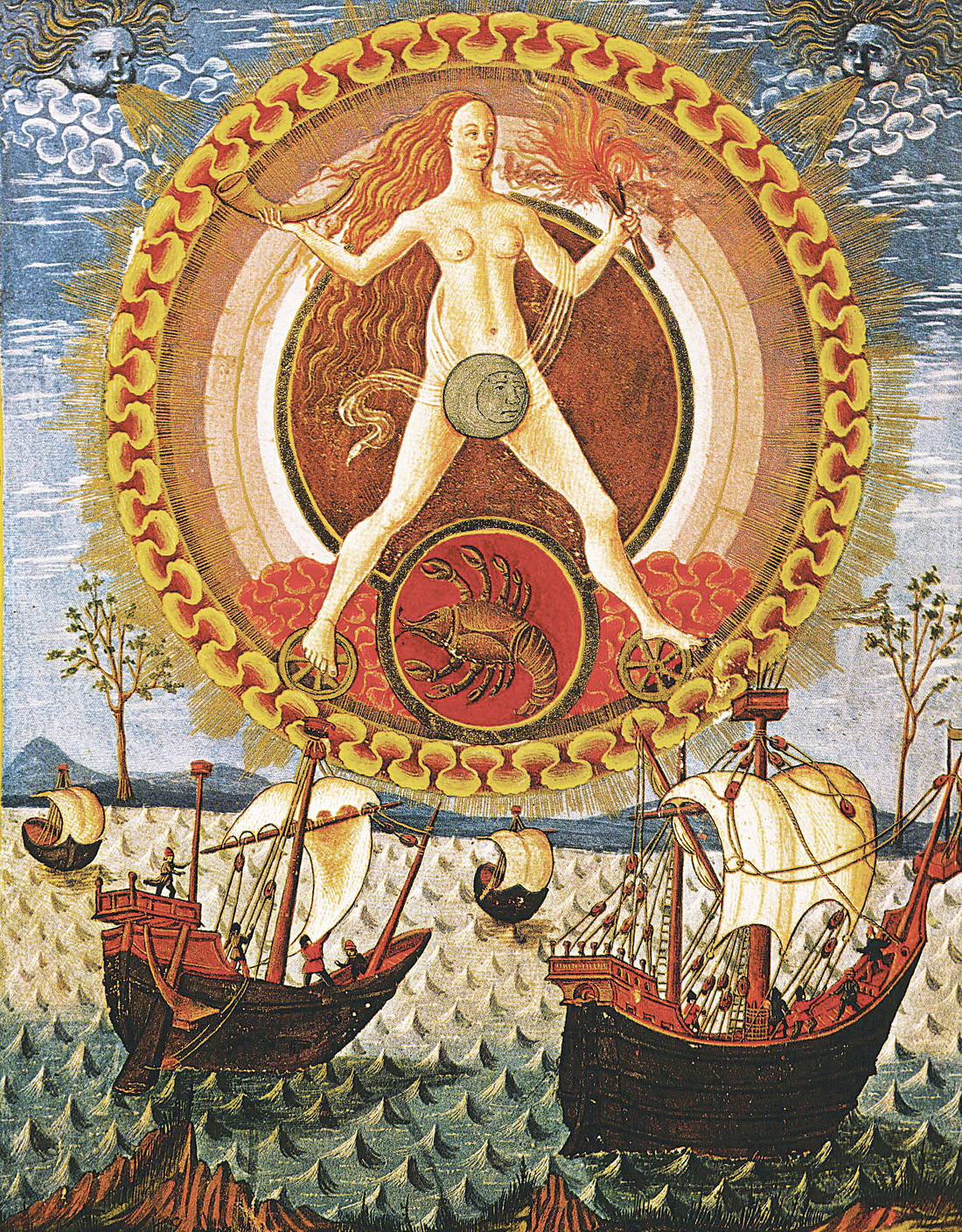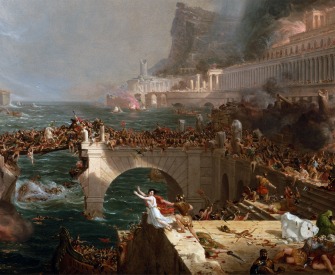See one promontory (said Socrates of old), one mountain, one sea, one river, and see all.
—Robert Burton, 1620In the Hands of God
A Spanish friar suffers at sea.
By the grace of our Lord, on the morning of Wednesday, July 9, six months after leaving Salamanca, we hastily scrambled aboard the small boats that carried us out to the ships on which the remaining members of our order were booked for passage. For all of us, however, it was disheartening because the weather was no longer favorable for sailing, even though the fleet, consisting of twenty-seven vessels, including caravels and a galleon, was now ready to depart. Embarking all on the same ship at this time was the largest group of our order ever sent to the Indies. There were over forty-eight friars and many other secular clergy as passengers, and chief among us was the Bishop of Chiapas, the Very Reverend Bartolomé de las Casas. Having triumphed over the Council of the Indies, he came armed with royal authority to remedy the ills of the Indians and to free the slaves. Also aboard our ship was the wife of the viceroy, Maria de Toledo, who was returning to the island of Hispaniola; rather inopportunely, she demanded that two priests travel with her. After considerable difficulty, the matter was finally adjusted by assigning to her Friar Juan de Cabrera de Cordoba from our monastery in Valladolid and Friar Alonso de Vallisante, its vicar. Her brother, Friar Antonio de Toledo, of the same order also joined her retinue, and collectively they were made comfortable and their needs well attended to. The Father Prior of the island and city of Santo Domingo was also with our group, though not on our ship.
We came aboard joyously chanting litanies and other prayers, thus beginning our permanent exile from our country with as much gaiety as travelers customarily display at homecoming after years of hardships and wandering abroad. We did this because we anticipated pleasant rewards both on earth and in heaven for our coming trials and tribulations. Immediately, we spent the whole day broiling in the sun, but with a slight breeze the sails were hoisted the next day, because the seamen alleged that once we were out on the high sea, we would start sailing with any kind of wind.
We endured such scorching heat that I do not know how to describe it. We suffered particularly because we had just left very comfortable quarters, and because it made the ship’s pitch ooze between the planking.
Since there were so many of us, the Father Vicar had arranged to have us all travel together, thinking in this way we would be a comfort to each other, help each other, and that we would thus get along with less baggage and fewer provisions. But it was a great mistake, for when only two or three clergymen are on a single ship, they are waited upon, cared for, and treated with great respect, even though they bring no supplies with them. But with all of us together, they treated us like negroes, making most of us go below deck to sleep, and tramping over us as we were seated or lay sprawled about the deck floor. And often it was not just our ecclesiastical habits that they stepped on but right on our beards and faces without the least consideration for us as holy friars. And there were a lot of other annoyances and outrages that I hardly know how to describe. The first day we chanted all the services, but because of such harassment, we sang only the Salve the second day, and each one recited the canonical hours whenever he could manage to do so.

The moon accompanies ships sailing under the sign of Cancer, from a manuscript of De Sphaera, fifteenth century. Biblioteca Estense, Modena, Italy.
The next day we hoisted sails and dully watched the coast of our Spain disappear in the haze. A good, though faint, breeze was blowing, and we soon realized that the sea was not man’s natural habitat. Everyone became so deadly seasick that nothing in the world could induce us to move from the spot where we lay; only the Father Vicar and three others remained on their feet. But the latter were in no shape to be of help, and only the Father Vicar was able to wait on us and push the basins and containers near us to vomit in; and if they didn’t happen to be close at hand, they were useless. With us were four or five lay youths who wished to serve God in the Indies, and they waited upon us and assisted us, but in turn they soon succumbed and required attention. Nothing could induce us to swallow a mouthful of food, though we were faint with hunger, but we never ceased to long for a drink of water.
A more befouled hospital and one so filled with the moans of the sick can hardly be imagined. Some sufferers were cooked alive in the heat below deck, while the sun roasted others lying about the deck, where they were trod upon and trampled, and where they were so filthy that words are inadequate to describe the scene. Even though several began to recover in a few days, their improvement was too slight to enable them to nurse the others who were still completely seasick. Bishop Las Casas gave the chickens he was bringing to the sufferers since the rest of us had not brought any, and a clergyman bound for Chiapas to teach ecclesiastical studies helped the Father Vicar in the task of nursing. The severest hardship for us was to read our prayerbooks, but despite everything, we recited our prayers as best we could, however tardily and badly, for we did not dare to omit them. But we only chanted the Salve in unison.
The night before disembarking on the island of Gomera in the Canaries, we took off our tunics and sandals and, if we could, removed our scapularies. It was the saddest sight in the world to see us, and no one could comfort us because we were all in the same plight. At the time we left our homeland, Spain and France were engaged in a bitter war, and as a result, we sailed in constant terror of French attacks. On the afternoon of that day, those who could raise their head above the rail caught sight of sixteen sails, and that night the whole fleet was terrified fearing that they were French ships despite the fact that such opponents would have been more afraid of us. Next morning, however, not a sail was in sight and it was surmised that what we had seen was a Spanish fleet returning from the Indies. That day we cast overboard the cabbages, lettuce, and radishes brought on the voyage in the belief that they could be eaten. By nightfall our stomachs had calmed down and we no longer vomited, but—especially below deck—we endured indescribable heat. A large ship was sighted Saturday morning, and suspecting that it was a French spy, one of our vessels sailed toward it. The strange ship started to flee. Ours fired a shot, whereupon it lowered its sails. Then, recognizing that it was a Spanish bark, we allowed it to proceed on its way. When the rest of our fleet heard the shot, they thought that we had come in contact with the French enemy and that a bombardment was in progress. And when we heard the racket of getting weapons ready below deck, we were greatly alarmed, but we quickly recovered from our fear and recited a litany. Some, however, took confession from each other, while others simply made a joke of it. As soon as we knew that it was nothing to worry about, we relapsed into our usual state of torpor and dropped back into our former postures. No further disturbance followed this episode.
To help those who are unfamiliar with life at sea understand something of the hardship and suffering that it entails, especially at the outset, I shall set forth a few circumstances that are perfectly obvious to anyone who has been to sea. First of all, a ship is a very narrow and stout prison from which no one can escape even if he wears no shackles or chains. In its cruelty it makes no distinction of its inmates, keeping them all equally confined. Closely crowded in cramped quarters, heat and suffocation are unbearable. The deck floor is usually one’s bed, and though some passengers brought soft mats, ours were small, hard, and bad, thinly stuffed with dog hair, and our bed covering was extremely wretched goatskin blankets. Moreover, there is so much nausea and vomiting on shipboard that some passengers move about as if in a trance and are very peevish.
Some remain in this state for long periods, others for a shorter time, and still others continuously. No one has the least desire to eat and can hardly face anything sweet. The thirst that one endures is unbelievable, and it is increased by our fare of hardtack and salt beef. Water is measured out a half azumbre [about a liter] a day; wine is drunk by those who happen to have it. An infinite number of lice eat one alive, and clothing cannot be washed because salt water shrinks it. Everywhere bad odors pervade the ship, especially below deck, and the stench becomes intolerable when the ship pump is working. This operation varies according to whether the sailing is smooth or not, but it goes at least four or five times each day, pumping out the water that has leaked into the hold, and it smells very foul indeed. These annoyances and many other hardships are very common in shipboard life, but we feel them more keenly because they are so alien to what we are accustomed to.
In addition to the foregoing discomforts, when one feels well enough there’s no place anywhere on the ship where one can study or withdraw to himself; one remains eternally seated since there is no place to stroll or move about. Everything must be done sitting down or sprawled out, or perhaps standing up for a short while. Besides all these discomforts, death is forever before our eyes with only the thickness of one plank sealed to another with pitch separating us from it. Seven of our group never once lifted their heads above the rail to look at the sea since they were seasick and miserable during the whole voyage. The rest, however, recovered—some sooner and more completely than others. The ship was so badly laden, that is, it was empty below and top-heavy above, that it rolled from side to side, not as it properly should, but tipped so far over that first one side and then the other was completely underwater. Sometimes the ship dipped so far under the sea that it flooded over half the deck, and the barrels piled up there were all afloat. Ropes were tied from one end of the ship to the other so that one could go from the stern to the prow by clutching them. It was impossible to cook our meals, for the ship tilted so far over that half was underwater, and passengers lying on the deck assumed an almost perpendicular position. The effort to remedy this precarious situation by stowing pieces of ordnance and other heavy objects below deck was all to no avail. From the Sunday when we embarked until the very last day, we were under continuous threat of death. Passengers on the other ships of the fleet prayed for us daily, and often they gave us final blessings because they felt so sure that our ship was going down.
About This Text
From “Diary of Travels: from Salamanca, Spain to Ciudad Real, Chiapas.” Father Tomás de la Torre was one of the Dominican friars who accompanied Bishop Bartolomé de Las Casas on his mission to Santo Domingo in 1544. He later traveled to Guatemala, where in 1551 he became provincial of the order.



